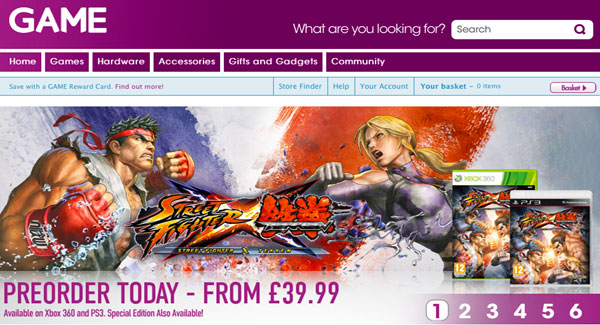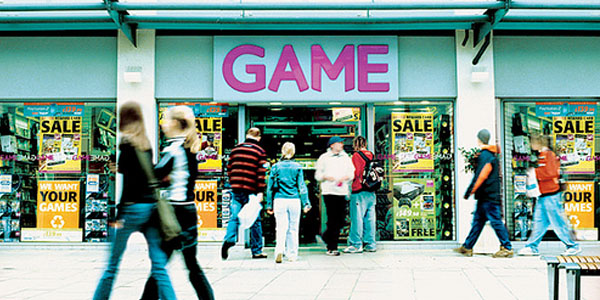In March, Game, the UK’s largest retail chain for gaming, entered administration. Although it is now out of administration, Game had to close 277 of its UK and Ireland stores; losses of around 40% to the entirety of its work force. New owners now say there will be no further closures, but with the company in heavy debt and the market seeing a massive shift towards online/digital distribution; what will the future hold for Game and Gamestation?
It’s difficult to push one reason as being the single cause, however, there is one problem that does stand out heavily against the others; Game’s self-destructive desire to monopolize the high street gaming market. For those unaware, Game and Gamestation are the same company. In 2007, Game bought Gamestation. It’s fair to say that this was reasonably impulsive. Game didn’t want to be beaten to the bat by American competitors Gamestop, and by buying Gamestation, they were well on their way to a monopoly of the UK gaming market.
With Game ever expanding and having stores throughout the UK, it became apparent that they were mainly competing with themselves, leading to saturation of the market. The company soon found itself in a position where they had multiple stores in the same city centre. Coupled with the consequences arising from a crumbling UK economy, Game’s base operating costs were spiraling sky high.
As well as with competing with itself, the tax break in places like the Channel Islands meant that what would be £40 on the mainland, would be closer to £34 on the internet. With Game having agreed prices to buy the games from distributors, and having to make a margin in store, they were unable to compete with Steam or play.com/amazon.com etc. With retail giants like ASDA and Tesco being able to supply games at a much lower cost first hand, Game’s price match soon became limited to mile radius’ and effectively void, as it was unable to compete with Supermarkets selling at a loss. 
Game’s online site was poorly marketed and extremely user unfriendly. The products that Game doesn’t manage to sell go back to the suppliers, who would then send them elsewhere to get sold. Game didn’t have the reserve cash to buy games outright and wanted to get the products on credit from the suppliers. The general rule of thumb is suppliers would give Game stock and get profit back. With sales falling massively at Game, Nintendo and EA soon refused to supply them. This was the first sign of Game truly encountering problems; having to refund all pre-orders for Mass Effect 3 and being unable to stock many new titles.
Game has angered EA in the past so it’s not too surprising that EA turned down the decision to work with Game on credit. A couple of years ago, Game had the chance to split profits on pre-owned games with the respective companies. but Game refused this offer. Game has a huge focus on the second hand market. Pre-owned titles generate massive profit from the difference between the buy-in and sale price. What generally happens when you complete a game you’ve bought for second hand? You trade it back in, noticeably receiving a lot less than what you paid for it. It’s not surprising to see Game focusing its energy on a market which is pure profit.
Oh, there’s a market in which we can generate 100% profit? This sounds great! And in comes competition from pretty much every media retailer. Game was at its most successful point when there was no one else, apart from the little guys, offering customers the opportunity to trade in their games. Now, even retail giants like Asda are doing it. “Mum, when you go shopping today can you take these games with you, or pick up title x/y/z for me please?” It’s the obvious, little things that can be the biggest threat. I’ve already mentioned that Super Markets, if they so wish, can sell at a loss. They’re going to make money back; they have so many other items in the store they can make money on so they’re not losing anything in the long run. What they are doing is showing distributors how quickly they can sell their titles, surely securing a larger deal for next time. It’s also a lot easier and convenient to pick up a game if you’re already on your way to do a quick shop, as well as the added fact of impulse buying which may arise whilst shopping for other items. They’re now hitting a different audience; customers no longer have to go out of their way to a specially catered shop to pick up a game title.
One thing that Game doesn’t do is stock a large variety of media products from different brands. This means that when it comes to making a loss, Game has been hit the hardest due to the fact it has nothing to else to fall back on in sales. Take the CEX franchise for an example. Managing to grow ever larger in the UK, CEX sees little competition due to the large variety of digital entertainment products it stocks. They trade in and they buy in for cash. Managing to stock and trade items such as Mac’s, PC’s, Phone’s, DVD players and many more means the company finds it almost impossible to suffer a single painful blow. They have a constant source of retail whereas Game has found itself in the unfortunate situation of saturation in the gaming market. 
Gaming stores do well when a new console comes on the market. There’s never too much of a price difference between competitors and the demand is usually high enough for everyone to do well. The Wii seems to have set change in the market, with many developers now focusing on peripheral devices such as the Kinect for 360 and Move for PS3. With the release of the above peripheral devices, everything that can be done in this console generation has been done. Other than bulk deals on consoles, in which Game are known to attach the crap games which no fool would buy unless otherwise included (offering a warped incentive that somewhere along the line you’re saving money because you’re getting a lot of games for cheap yet they wouldn’t sell on their own), developers can’t push consoles any further than they already have. With the launch of the 360 in 2005 and PS3 and Nintendo Wii in 2006, this console cycle has been the longest so far, and it certainly hasn’t helped that it’s all happened in the midst of a recession.
So, the market changes course and heads towards creating simplicity online. Instead of making people buy a hard copy games on disk, let’s let them just download it to their hard drive! This saves time, and it saves the developers money. Services such as Steam are becoming increasingly popular with more people finding an easy route into PC gaming, as well as it being very cheap. Money can be easily made by developers through small and cheap download games which have the possibility of going viral. On top of that, you also have companies such as Zynga who have free games to play online via sites such as Facebook but then charge an additional fee to play further into the game or buy add-ons. Going into a store where you can seek knowledge and advice from staff who know what they are talking about is lovely, but everything can now be done closer than home or a lot more conveniently.
It’s daunting to think where things could possibly go from here. There is definitely room for a specialist retailer on the UK high streets, however the company needs to streamline, and focus itself rather than dividing its attention over multiple target focus points. Greediness, no clear online marketing strategy, and competition from retail giants and digital sites have slowly leaded to the demise of this company. With the focus now being on movement and touch-screen technology, and sales via online download and streaming, it’s hard to not wonder what the future holds in store for the high street gaming retailers. Will it be a case of solely stocking hardware, or will there always be a desire for hard copies of games and additional content?